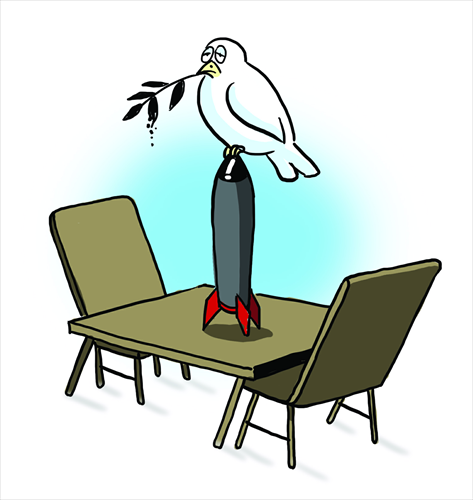US-Iran phone call offers sign of hope

Illustration: Liu Rui/GT
The historic phone call between US President Barack Obama and Iranian President Hassan Rouhani was the highlight of the recent UN General Assembly.
Grievances have long accumulated in the relationship between the US and Iran. Although representatives from both sides have met in ambassadorial negotiations on Iraq and at the P5+1 nuclear talks, no bilateral discussions have been officially carried out on important topics such as the nuclear issue. Both sides have accused the other of arrogance and stubbornness.
The positive significance of the historical phone conversation is that if both presidents can discuss nuclear issues under a broader framework based on the fragile trust that has just been established, providing a new impetus for resolving the problem.
Although direct bilateral discussions are highly likely to be limited to the nuclear agenda, this still brings hope of reconciliation.
However, it is too early to celebrate, since there are still important points of instability, and there's a long way to go from discussing nuclear issues to bilateral reconciliation.
The nuclear issues themselves are one point of uncertainty. Though Rouhani has stated that the nuclear problem will be solved by cooperation and transparency, Iran still claims research and development and production of enriched uranium on its own soil is its inalienable right.
Given this, Rouhani needs to strike a balance between the enlarging of nuclear transparency and guaranteeing Iran's nuclear rights. The P5+1 talks on Tuesday undoubtedly tests his wisdom in this regard.
As things stand now, the nuclear problem cannot be resolved by good will or compromise from a single side. The US position should include specific and substantive content, otherwise, uncompromising stances and suspicion will only draw the talks back to a vicious circle of distrust.
How the US will approach discussions is another uncertain point. To a certain extent, the US attaches more importance to resolving regional specific problems instead of improving the bilateral relationship through the direct talks. It expects that Iran can play a constructive role in helping Washington in regional issues, including hot spots in Afghanistan and Syria, whereas Iran focuses more on the lifting of sanctions and the improvement of the relationship.
Unless the US can take a more serious attitude to Iran and accept Iran's growth and important role within the region, its focus on specific issues will still stand in the way of improving bilateral relationship.
Powerful conservative forces in the US are another uncertainty. The current friendliness depends on efforts made by both presidents. However, bureaucracies and conservative politicians on both sides still have their own suspicions.
Obama's biggest obstacle comes from the US Congress and the power of the Israeli lobby. Obama will have to work hard behind the scenes to persuade Congress to lift sanctions and rebuild mutual trust.
Rouhani also faces pressures from Iran's parliament and military forces, as well as the religious elite represented by Iran's Supreme Leader Ayatollah Ali Khamenei. Israel may also influence the direct talks and healthy interaction between the US and Iran.
Since the exposure of the Iran nuclear issues in 2002, Israel has always accused Iran of developing nuclear weapons under the guise of peaceful usage, and viewed Iran as the biggest threat to its security.
It has actively urged the US to sanction and contain Iran. Israeli lobbyists' influence can been seen in US sanctions against Iran both in 2010 and 2012. Israel insists that it reserves the right to take unilateral actions against Iran.
Currently, Israel's attitude toward the historic phone call between Obama and Rouhani is quite negative. Israeli President Benjamin Netanyahu holds that Rouhani is conducting a dual policy of smiling and enrichment at the same time. The phone call is a hopeful sign. But whether the P5+1 talks can go well depends on all these uncertainties.
The author is an associate research fellow of the Institute of International Relations, Shanghai Academy of Social Sciences. opinion@globaltimes.com.cn